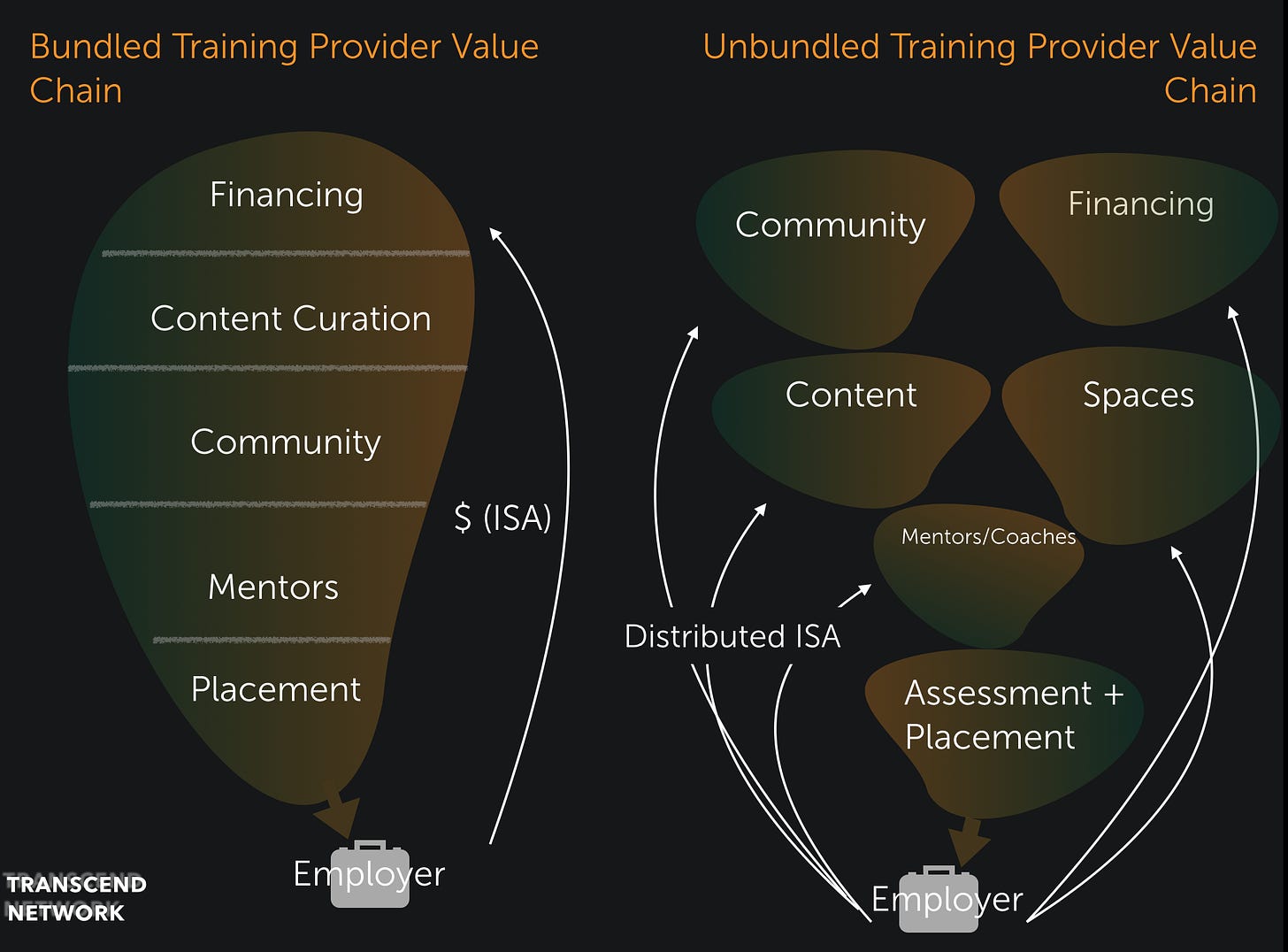The Placement Economy 📮Transcend Newsletter XXI
Explaining the greatest threat to the new bootcamp model today.
This week we hope to give you insight into the Placement Economy - a term we may or may not have made up but will certainly play a key role in the future of bootcamps and upskilling.
Do you have a LinkedIn connection that works in higher ed/upskilling? Is a followup long overdue? Send them our newsletter!
tl;dr: many new bootcamps are struggling to place students in jobs at scale - in an “unbundled” world of learning, there’s a great need for new players that connect employers and bootcamp students.

First, what’s this Placement Economy?
Think about it as all the economic activities that involve placing students into jobs - similar to recruiting but from the student and training provider side (these are bootcamps and other non-university educational programs), rather than the employer (recruiting firms).
If you are thinking about a Career Services office at a university, you are pretty far off: most of the new bootcamp models only allow the training provider to get paid after they successfully place the student, which gives them a great incentive to position them in a high paying job.
The model seems pretty straightforward, and as education continues to “unbundle” (with more providers that can provide certificates and learning programs outside of colleges) it is becoming easier than ever to build these bootcamps: you put a landing page together, curate some existing content (the majority of bootcamps do not create their own educational content), find some instructors that teach over Zoom calls, graduate the students and start collecting the cash. The future of education!
Only there's one bottleneck many of these programs are facing (and we've seen multiple cases through the Transcend Fellowship applications): while the first few students will get hired without many problems, there is an increasing marginal cost to place graduates (it only becomes harder after the first placements).
Why should we care about placements?
Hear it from an industry insider (Kim is the CEO of Cluster):


So placement doesn't really scale. And placement matters, for bootcamps but also for the economy as a whole.
Placement may just be (hot take alert) one of the keys to bridging the skills gap (learn more about it here): since 85% of jobs are filled through personal networking (and millions of students are underemployed globally (but especially in high-income economies), there is no guarantee that simply releasing hundreds of thousands of prepared graduates into the labor market would actually resolve this skills gap (see how employers raised the bar following the 2008 crisis given there were plenty of prepared candidates for any given job!).
Everyone is feeling this pain. Bootcamps like Lambda School are experiencing difficulties placing these students, precisely because placement work is not as easily scalable as the content or instruction.
Even MOOC course providers have pivoted to employ students directly upon the completion of its certificate courses (which are paid and often highly time-intensive). Most of them now focus on creating courses with one employer partner (a private company that is relevant to the subject of the course) who's the first interested in hiring the best students upon graduation (these often happen through universities, known as the OPM market).
Now, job placement is an important part of the education value chain but cannot be sufficient as a job board and/or employer network - it involves both an assessment part (to understand the skills of the student on a much deeper level than a simple curriculum overview) as well as a partnership network (finding employers that need the skills you are teaching), on top of soft professional development skills taught to students through the program.
The Future of Online Learning Communities
Seeing multiple startups in the upskilling/bootcamp space struggle with job placements in their value chain, we have developed our own thesis about where this stage fits in the education value chain and what future solutions could look like.

In the bundled model, the training provider provides almost all services for the student: from financing (usually by raising huge amounts of VC funding) to the content (curated from existing resources, the current standard), mentor network, community and placement. Upon successful placement, the provider receives revenue through an Income-Sharing Agreement (ISA).
In the unbundled model, which we seem to be moving towards, there is a wide variety of agents across the value chain that work with one another: the financing is provided by external issuers (like Leif) that take care of the ISAs, the content could be open-sourced (like the Odin Project), the community shared by students across different programs (like CareerKarma) and even physical spaces (like Shift_Up), with the last step being the placement player. All these receive a share of the ISA.
This last player conducts an assessment that can be tied to employer-specific microcredentials and places the student with a company that is a good fit (and specializes in finding these employers outside of the networks existing bootcamps are using).
We’ll keep an eye out for more companies in this space!
What do you think? We’d love to get your thoughts: please leave a comment or reply to this email!

📅Some college, no degree: 36M people in the US hold some college credits but no degrees. Over 1 million managed to get a post-secondary degree in the last five years after being in this status, but many more will be needed to address the student debt crisis.
🖐️AI will automate tasks, not jobs - to learn more about the depth and breadth of impact of AI on the workforce, check out Strive’s thesis on the future of work.
📖18 large-scale Edtech interventions to keep an eye on this year - with real evidence to back them. It all starts with asking the teachers what they need!
👩🔬The Essentials Fellows cohort looks for ways to empower founders to work with local school communities - here are this year’s fellows (with some friends of Transcend!)
👋Looking for opportunities or want to say hi? Introduce yourself here!


Chief Business Officer at Minerva Project
Minerva is hiring its first Chief Business Officer to drive the development and partnerships for The Forum, the B2B live video environment for teaching courses using the Minerva Schools pedagogy and experience. Learn more about Minerva Project.
If you are interested, want to learn more or know anyone that could be a good fit, send an email to alberto@transcend-network.com
All the updated job opportunities can be found on our Job Board!
Venture Associate - EdConnective
Social Media Manager - Edutive
Software Engineer and Head of Coaching - CareerCopilots
Fill out this form if you are looking to hire or get hired, and check out our job board for updated openings.

👀Learn more about our Transcend fellowship.
This week we’ll learn more about Eric Anderson, CEO of Junto

What does Junto do?
Junto makes interactive mobile courses that teach skills for the modern workforce in <10 minutes a day, teaching subjects like design thinking, managing feedback, writing clearly, storytelling, and systems thinking.
What stage are you at/what are you working on this quarter/year?
For the next couple quarters, we're doing 2 key things:
Working with our growing beta group to improve our core product experience to deliver the most fun and effective bite-sized learning experience for mobile.
Developing several more courses that cover key topics our users want to learn, including Systems thinking, Storytelling, and Using Coaching Techniques in Conversations, and Kickstarting Creativity. We have some experts we'll be partnering with for some of these courses that we're excited to announce
What is one trend/shift that you are confident will be a part of the future of learning and work?
Ongoing, intentional, and social learning of meta-skills (all the non-hard skills).
We place a lot of emphasis on learning how to write code or run SQL queries, but we’re now realizing the importance of all these meta-skills, like how to tell compelling stories, how to write clearly at work, thinking in systems, motivating teams, using coaching techniques in conversations, managing burnout and stress, honing our ability to think creatively, or managing how we receive feedback.
These skills are essential to succeed in the new highly complex, dynamic and collaborative jobs that are quickly becoming a huge part of our economy.
What’s your call to action to the community?
We're looking for people we can work with to help create our next few courses. Right now they can be either:
An instructional designer who can up to speed on the subject matter we're teaching. Our next few courses we will be based on excellent non-fiction books, so they can up to speed on the subject matter quickly (Thinking in Bets by Annie Duke, Thinking in Systems, Donella Meadows, Influence: The Psychology of Persuasion by Robert Cialdini, Storytelling (book not yet selected, potentially direct partnership), Design Thinking.
Subject matter experts to create courses that are not based on non-fiction books, and instead are based on the expert's experience.
If you know anyone that could be a good fit, reply to this email and we’ll connect you with Eric!

Thanks for reading another week! For any feedback, requests or ideas, reply to this email.
Please take a minute to share if you found this newsletter interesting!
Alberto(alberto@transcend-network.com) & Michael (michael@transcend-network.com)




